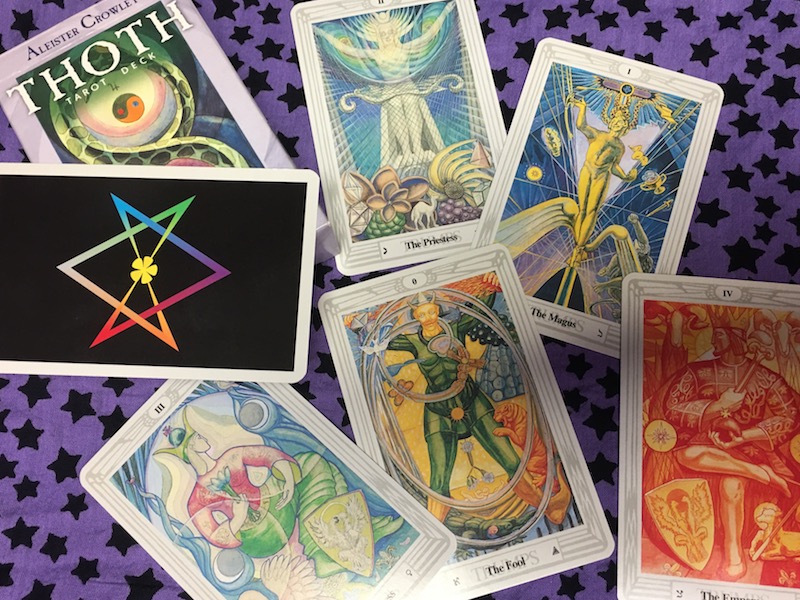
Casting Spells Doesn’t Pay Bills (But Are Fun to Read And Fiction Needs More of Them)
I grew up in a household molded predominantly by two similar yet antagonistic faiths. On my mother’s side, most family adhered to the LDS faith – that is to say, what most would call “Mormons.” On my stepfather’s side, there was a pull from what I knew at the time to be “Allred Mormonism” but which is perhaps better known as the Apostolic United Brethren. These faiths might seem like they would go hand in hand, but in actuality there was a lot of dissonance between them. More importantly, however, is that each had their own dark secrets that as a child I wanted to unlock and master. My grandfather on my mother’s side said as a prophet I would work miracles, even raise the dead – he’d seen it done before! (But he also really hated ‘colored’ people. Like, a lot.) My mother’s family thought I could grow up to travel the world, spreading a message of good will and some day visit a temple and have secrets given to me!
Neither of those happened.
As a late teenager, my descent and ascent from and into the occult started strangely enough not with popular sects of neopaganism, or goth culture. It started with the Tao Te Ching, and from there a yellow book written by a modern author that expressed Taoism in a modern context and also discussed drug use a lot. I really wish I could remember the name of that book. I’m kind of curious how well it aged.
From there I tripped into various sects of neopaganism (which in the late 90’s and early 2000’s found itself branded and marketed as “Wicca” despite Wicca being a very distinct religion) and found myself in a weird place where I could never really believe in any of it yet found it all really fascinating. I devoured books written by authors many would consider taboo not because of the power they might gift an individual but because of how exploitative and full of information they were. I enjoyed the simple writing style of Silver Ravenwolf, even as her books were derided by the Neopagan community as “fluff bunny” and her narrative was problematic in how it handled such things as teenage believers. I read and considered works by Gavin and Yvonne Frost, even as they alluded to (and apparently in earlier editions outright called for) the breaking of a girl’s hymen at puberty, preferably by a male authority figure such as a father. I read Raven Digitalis’s Goth Craft as well as his Shadow Magick Compendium, solely on the fact he came from a city near to my actual hometown and my adopted one; I didn’t dislike the author as an individual despite stories I heard from people who claimed to know him, yet my personal opinion of his works were that they lacked any sense of authority or citation (but am excited to learn that he still has an exceptionally active Facebook group.)
I found the “plug and play” nature of Neopaganism to be rather fascinating, completely ignoring the way that doing so absolutely appropriated entire cultures and their views and religions simply for modern magical work. I enjoyed reading into complex magical systems, even if often there was little desire for me to use them. I enjoyed putting older stories in a more modern context, especially with the lore found behind Kemetism. Ultimately, however, the idea of putting fancy catalysts together and then just hoping and waiting… didn’t work for me. For all that effort, I might as well be thinking and praying. Thoughts and prayers.
In some ways this was kind of a shame. Being able to read Tarot cards with my well worn Thoth Tarot deck was a unique icebreaker. It was always kind of neat to hear other people share their beliefs and poke and prod them a bit. I would also argue that, at times, people of different magical traditions were still willing to come together for certain common goods and goals. In others, however, there was a certain loss of practicality. I should have been studying psychology and game theory. I should have learned to program and to manipulate. Crying out to a Goddess isn’t nearly as competent a skill as learning to debate someone and get them to agree with you.
In time, I fell out of favor with these things, and began worshiping a deity many of us know all too well: Mammon. Had to pay bills and keep myself feed. Keep my nose to the proverbial grindstone.
This all ties in to an issue I have with a lot of fiction stories I’ve been reading lately, and a rising trend in general: the gamification of spells and abilities. In many novels, casting a fireball or summoning a demon or enchanting a weapon are a transactional affair – spend mana (or MP or whatever) and cast ability. It’s straightforward, it makes sense, but it’s not very *fun*. Even in popular fantasy, a lot of these spells and abilities are treated with the gravitas of learning how to repeat a basic phrase in a foreign language. The transaction and the price are all in the phrase shouted itself; to cast a fireball one simply shouts “Fireball!” To find a bathroom, one simply shouts “Donde es el bano?”
This in my opinion is a huge wasted opportunity. Surely not everyone wants to, say, ground themselves and call upon the earth to protect them before calling upon Salamander to burn their foes. Yet with the glut of “transactional” magic and super abilities in modern pop literature, I’d absolutely love the opportunity to read this.
I may not be in a place in my life where I can go outside and call upon the four towers, but I certainly would be interested in characters that are expected to do this. Yet in games and in novels it appears that outside of villainous super-plots even the most basic of rituals have been forgotten or outright forsaken. To an extent, this makes sense. In a video game, it might become tiring if, in order to use an ability, there required a tedious amount of work outside of pressing the correct button and paying a set resource cost as needed. That said, it could lead to a heftier feel for each action done that was not mundane.
In the meantime, I’m thinking about opening myself up a bit to new things and old by connecting with people who still hold some of these modern day paganistic practices true to their hearts and see what I may have lost. Although I will likely be avoiding the drama, which I’m sure has only gotten worse in North American circles over the last decade or so.




